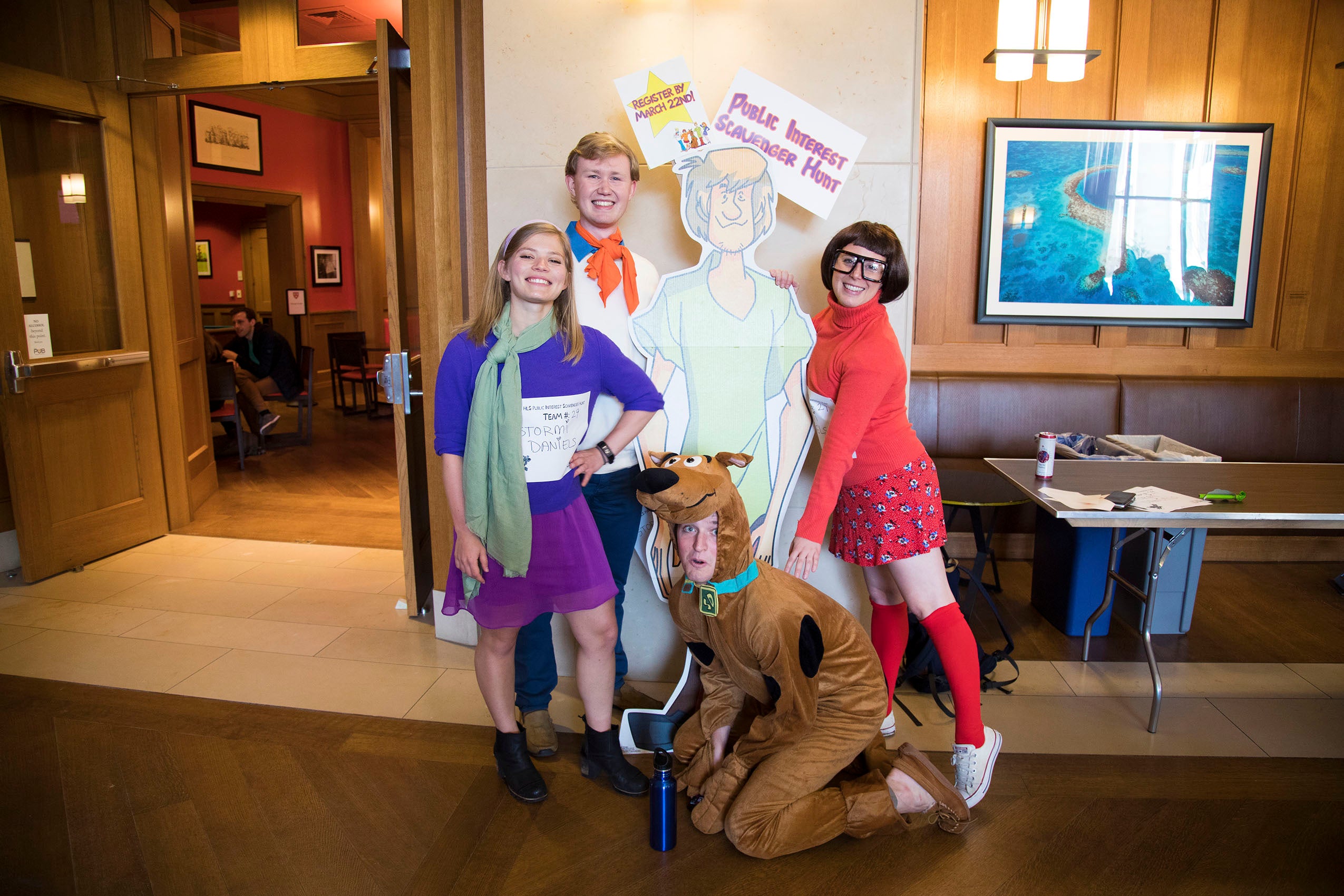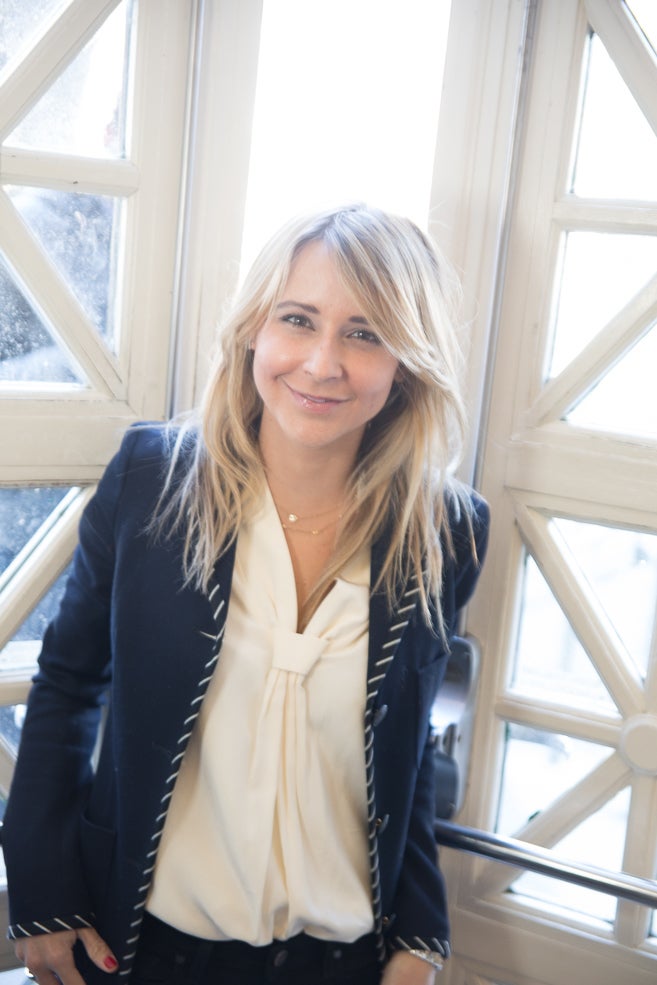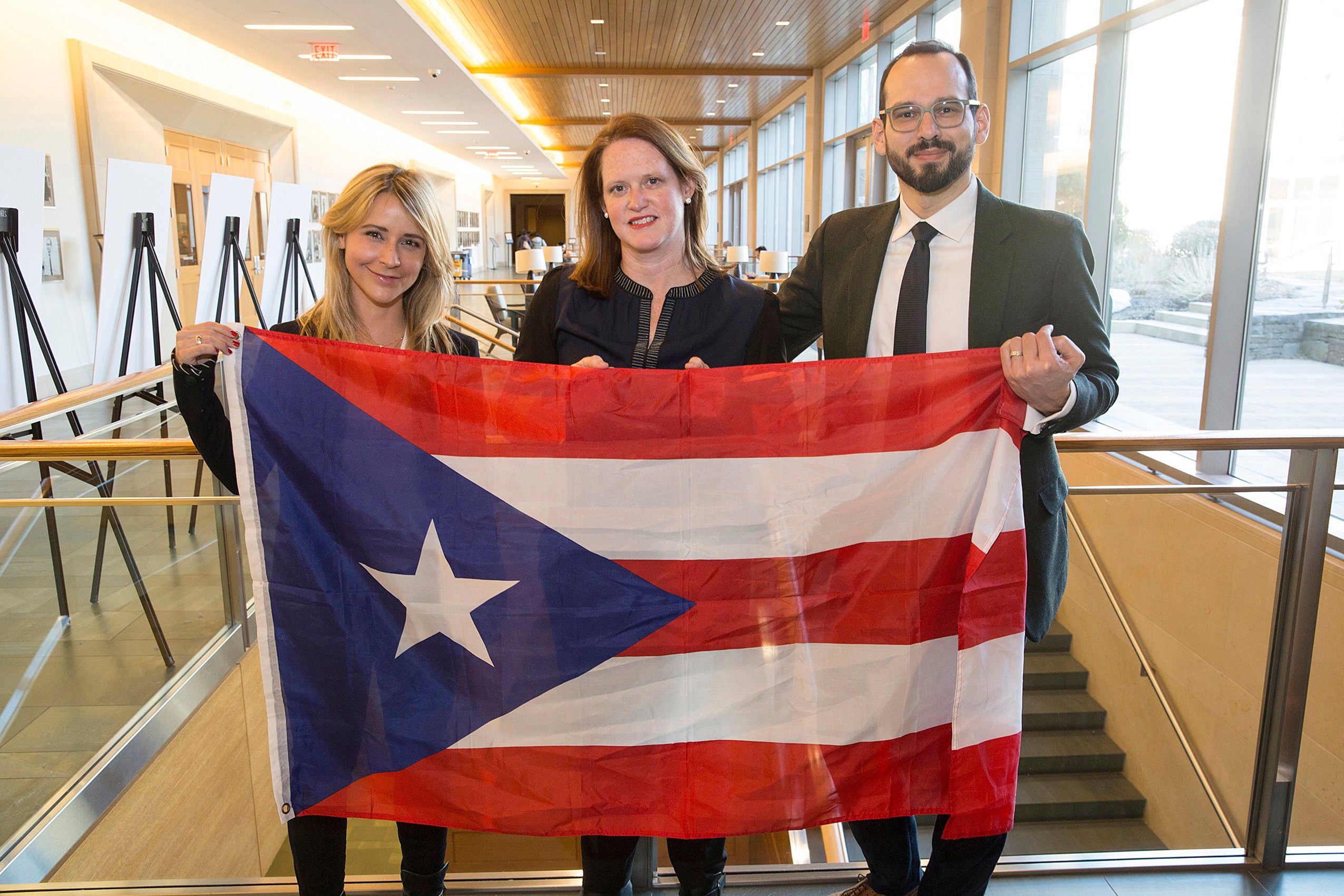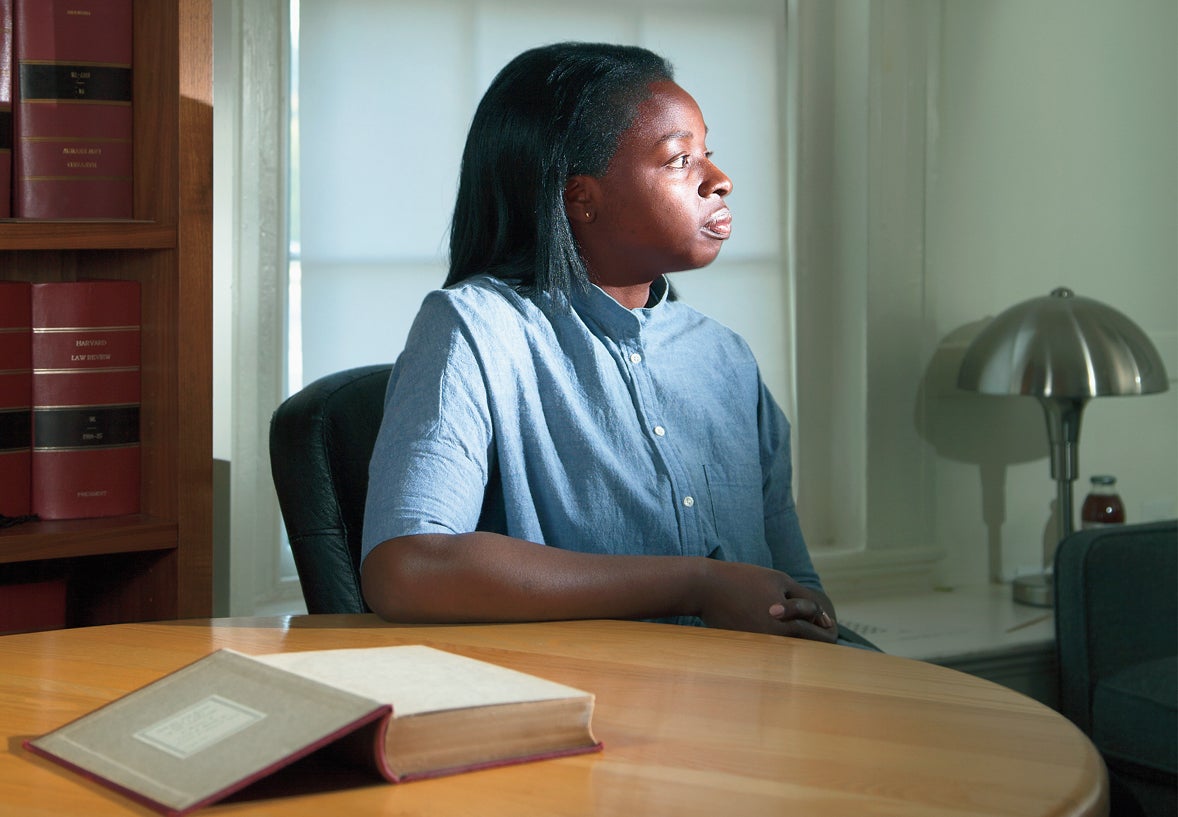People
Andrew Manuel Crespo
-
Now in its second year, the Harvard Law School Public Interest Scavenger Hunt continued its focus on HLS history and trivia, but also highlighted alumni who have done important public interest work.
-
Natalie Trigo Reyes ’19 wants to help vulnerable communities—starting at home in Puerto Rico
April 5, 2018
After Hurricane Maria roared over Puerto Rico in 2017, Puerto Rican native Natalie Trigo Reyes ’19 felt “completely overwhelmed.” Within days, however, she raised $40,000 for relief efforts, collected truckloads of emergency goods, and helped plan the school’s response to the disaster.
-
Law students help to mend Puerto Rico
April 5, 2018
A group of 29 Harvard Law School students (led by Natalie Trigo Reyes ’19) traveled to Puerto Rico over spring break to lend a hand to local residents who are still struggling to obtain disaster relief aid.
-
Law students help to mend Puerto Rico
March 30, 2018
A few weeks after Hurricane Maria swept Puerto Rico last September, Harvard Law School (HLS) student Natalie Trigo Reyes ’19 visited the island where she grew up, and found an unrecognizable landscape...Trigo Reyes led a group of 29 HLS students who traveled to Puerto Rico over spring break to lend a hand to local residents who are still struggling to obtain disaster relief aid. Puerto Rico is a U.S. self-governing territory and its inhabitants are American citizens, although they can’t vote in presidential elections or elect representatives to Congress. The HLS trip was spearheaded by Andrew Crespo ’08, assistant professor of law, and coordinated by the Office of Clinical and Pro Bono Programs, led by Lee Mestre...Thinlay Chukkii, LL.M. ’18, was part of the humanitarian brigade. She and 10 classmates worked on several houses damaged by the hurricane...The experience left a mark on Chukki and reinforced her desire to pursue a career in public interest law. Something similar happened to Kevin Ratana Patumwat, J.D. ’19, who was sent to Ponce, Puerto Rico’s second-largest city, to help residents file FEMA appeals. Patumwat also said he was touched by people’s generosity and grace...“I remember the national reaction to Hurricane Katrina,” said Crespo. “The whole country wanted to help. It felt that part of being American was wanting to help our fellow Americans who were struggling. With Hurricane Maria, it felt different. It felt like a struggle to get the country to realize that there were 3 million Americans without electricity or drinking water.”
-
...From the more than 100 Boy Scouts from across the mainland US helping to rebuild a scout camp in Guajataka to 31 Harvard law students providing pro-bono legal aid and humanitarian work, spring break in Puerto Rico this year is a far cry from lazing on the beach. In “school, you tend to forget what real life is about,” says Kevin Ratana Patumwat [`19], a second-year Harvard Law student. He’s come to better understand the disaster, which, as of March 9, still had left nearly 150,000 homes in the dark...“In the legal profession, as in others, there’s an ethic we try to teach of service and the idea that with the privileges of education and opportunity come a responsibility of service to others,” says Andrew Crespo, an assistant professor at Harvard Law School who is Puerto Rican. He helped launch the Hurricane María Legal Assistance project last fall.
-
Sotomayor Renews Call for Experienced Criminal Defense Advocates
January 30, 2018
Last fall, Justice Elena Kagan touted the advantages of an experienced U.S. Supreme Court Bar—the “repeat players” who know what the court likes. Justice Sonia Sotomayor seems to think criminal defense lawyers still aren’t getting the message...Lamenting the lack of diversity on the high court itself, Sotomayor said in 2013 she was bothered by the fact judges rarely come to the bench from the defense bar or with civil rights experiences. “We’re missing a huge amount of diversity on the bench,” she said. A 2016 study by Harvard Law School’s Andrew Crespo analyzed what he called the high court’s institutional shift over the last four decades toward the prosecution. One part of that shift, Crespo found, was the “rise of a sharp advocacy gap between criminal defendants and the rest of the increasingly expert Supreme Court bar, including expert advocates for the prosecution.”
-
What Will You Do if Mueller is Fired?
December 21, 2017
An op-ed by Andrew Crespo. Whether ours shall continue to be a government of laws and not of men is now for … ultimately the American people” to decide. Those were the words of Archibald Cox, the Watergate Special Prosecutor, on that fateful Saturday night in October 1973, just moments after he was fired by the president whom he was investigating. A question for the American people to decide. To their credit, the American people responded, with what Attorney General Elliot Richardson, himself also removed from office that night, would later call a “public uproar” of “overwhelming power.”
-
Shut Out: SCOTUS Law Clerks Still Mostly White and Male
December 11, 2017
A year as a U.S. Supreme Court law clerk is a priceless ticket to the upper echelons of the legal profession. Former clerks have their pick of top-tier job offers and can command $350,000 hiring bonuses at law firms...But amid the luster of being a law clerk, there’s an uncomfortable reality: It is an elite club still dominated by white men...And yet, most justices appear to be taking a passive approach to diversity rather than actively seeking minority clerks or pushing their networks to identify more diverse candidates. “I’ve never had that precise conversation with any justice,” said Harvard Law School professor Richard Lazarus, a comment echoed by several other clerk-recommenders interviewed for this story...Another trend that helps explain the lack of diversity is what Harvard Law School professor Andrew Crespo called “ideological sorting” in the clerk hiring process. Crespo, who in 2007 was elected the first Latino editor of Harvard Law Review, clerked for Breyer and Kagan. “The more liberal justices tend to hire a greater number of liberal-leaning clerks than the conservative justices, and vice versa,” Crespo said. “If the small number of African-American and Latino applicants are also disproportionately liberal, then there may be fewer clerkship slots for which they are realistically competitive candidates.”
-
Mentors, Friends and Sometime Adversaries
November 29, 2017
Mentorships between Harvard Law School professors and the students who followed them into academia have taken many forms over the course of two centuries.
-
How Have Harvard Scholars Shaped the Law?
November 29, 2017
ImeIme Umana ’18, the Harvard Law Review's 131st president, on how scholarship—and the Law Review itself—have changed through the centuries.
-
#NBCLatino20: The Legal Eagle, Andrew Manuel Crespo
September 27, 2017
With his stellar credentials, Andrew Manuel Crespo, 34, could have had a gilded entree to the elite worlds of finance, academia or government. He graduated from Harvard College magna cum laude. At Harvard Law School, he was the first-ever Latino president of the Harvard Law Review and he clerked for two Supreme Court justices. But when it came time to get a job, Crespo became a public defender in Washington, D.C. His first client was eight years old. The way his young clients and their families trusted him, Crespo remembered, was something that he never took for granted. “I was working in juvenile criminal court, and my clients were 12, 13, 16 years old,” Crespo said. “There is something very powerful about meeting people for the first time when they are literally behind bars. You are introducing yourself when they are at one of the most broken, vulnerable moments in their lives.”
-
Sheriff Joe Arpaio tries to fight dirty
September 19, 2017
Joe Arpaio might have been able to stay out of prison after President Trump pardoned him last month, but that doesn’t mean the controversial former Arizona sheriff has free rein to harass his critics. Arpaio, who had been convicted of contempt for ignoring a federal judge’s order to stop targeting undocumented immigrants, is threatening action against a Harvard Law School professor in a clear effort to use legal threats to deter opponents. The professor, Andrew Manuel Crespo, wrote a column in this newspaper earlier this month calling for the appointment of a special prosecutor to challenge the pardon on constitutional grounds. In Crespo’s view, Trump’s pardon may have been unconstitutional because it interfered with the judiciary’s ability to protect constitutional rights.
-
An Open Letter to Joseph Arpaio’s Attorneys
September 15, 2017
An essay by Andrew Crespo. Last week, I wrote an op-ed in The Boston Globe suggesting that a private attorney should be appointed to challenge the constitutionality of former Sheriff Joseph Arpaio’s pardon—a suggestion that has now been formally presented to the judge in Arpaio’s case. This week, Arpaio, through his attorney, threatened to sue me if I did not issue a retraction...Given the tendency of late for our political leaders to threaten lawsuits as a way to try to suppress speech that they find critical or unflattering, I have decided to publish here the complete letter that I received from Mr. Arpaio’s attorney, along with my response.
-
NBC Latino 20
September 15, 2017
The NBC Latino 20 honors achievers who are making our communities and our nation better...The first-ever Latino president of the Harvard Law Review, Andrew Manuel Crespo has clerked at the Supreme Court and represented children as a public defender. He has seen firsthand the chasm between our legal ideals and the reality on the ground. "We've told ourselves that whether you are imprisoned for years should not depend on whether you are rich or poor," says the Harvard Law professor, "but any lawyer who has set foot in a courtroom would probably agree that resources and money do make a tremendous difference."
-
A special prosecutor should challenge Joe Arpaio’s special pardon
September 7, 2017
An op-ed by Andrew Manuel Crespo. We talk a lot in the Trump era about novel constitutional problems, and a lot about special prosecutors. But in the wake of President Trump’s controversial pardon of former Arizona Sheriff Joseph Arpaio, it’s important to talk about both at once, and to ask: Should the US District Court in Phoenix, which found Arpaio guilty of criminal contempt, now appoint a special prosecutor to defend that conviction, in the face of a pardon that might well be unconstitutional?
-
An op-ed by Andrew Crespo. The New York Times recently unearthed a thorough legal memo, prepared twenty years ago for Independent Counsel Kenneth Starr, that advances the view that a sitting president can be indicted while still in office. For those keeping score, this new memo sharpens an internal divide within the Department of Justice on this important question. Two memos authored by the Office of Legal Counsel—one in 1973, in the midst of the Nixon impeachment saga, the other in 2000, on the heels of the Clinton impeachment saga—take the view that a sitting president is immune from indictment. By contrast, two different memos—authored by the Office of Special Counsel investigating Nixon, and the Office of Independent Counsel investigating Clinton—reach the opposite conclusion.
-
The debate over whether the president of the United States can be charged with a crime is as old as the country itself...The words of the Constitution aren't much help either. It talks about impeachment, removing a president from office. But the document is vague on the issue of whether a president can be indicted while he holds the office. "We tend to talk about it as one big on-off switch," explained Harvard Law School professor Andrew Crespo. "But, really, the question ought to be: Can he be investigated, can he be indicted, can he be made to stand trial, can he be sentenced? And the burdens imposed by each of those steps of the process are different."
-
The ongoing feud between the hosts of MSNBC’s Morning Joe and President Trump took a turn on Friday when Mika Brzezinski and Joe Scarborough published an op-ed, “Donald Trump is not well,” in the Washington Post. In it, they wrote, “This year, top White House staff members warned that the National Enquirer was planning to publish a negative article about us unless we begged the president to have the story spiked.” The story — ”Joe & Mika: TV Couple’s Sleazy Cheating Scandal” — was published on June 2. Quickly, some of Trump’s toughest opponents on Twitter questioned whether laws had been broken...Harvard Law School professor Andrew Manuel Crespo, who teaches and writes in the areas of criminal law and procedure, told BuzzFeed News that many questions would need to be answered to know whether it is even possible that the actions violated any coercion, blackmail, or extortion laws. First, he said, more context is needed regarding what the conversation actually was.
-
President Donald Trump won’t seek to invoke executive privilege to block former FBI director James Comey from testifying before Congress later this week...Any decision on whether to investigate the president or administration officials for possible obstruction likely will fall to Robert Mueller. The former FBI director was appointed by the Justice Department as a special counsel to oversee the FBI’s investigation after Mr. Comey’s dismissal. Legal experts differ on the extent of Mr. Mueller’s authority in the probe. “If Mueller’s investigation confirms what has been publicly reported, then he would be well within the zone of prosecutorial discretion to seek a criminal indictment for obstruction of justice,” said Andrew Crespo, a Harvard Law School criminal-law professor.
-
The Constitution does not answer every question. It includes detailed instructions, for instance, about how Congress may remove a president who has committed serious offenses. But it does not say whether the president may be criminally prosecuted in the meantime...But would the Constitution allow Mr. Mueller to indict Mr. Trump if he finds evidence of criminal conduct?...Andrew Manuel Crespo, a law professor at Harvard, has questioned whether the special-counsel regulations should be read that broadly. The regulations, he wrote on Take Care, a law blog, “focus more on administrative protocols and procedures than on legal analyses, arguments or judgments.”
-
An op-ed by Andrew Manuel Crespo. Robert Mueller, the recently appointed special counsel overseeing the criminal investigation into whether Donald Trump’s campaign coordinated with Russia, has a sterling reputation as a prosecutor’s prosecutor — someone who follows the facts without fear or favor, wherever they may lead. Based on what we know so far, those facts will lead him to the most consequential decision any American prosecutor has ever faced: Whether to pursue charges against the president of the United States for the federal crime of obstruction of justice.




